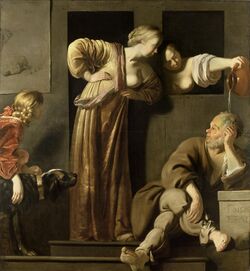Biography:Myrto

Myrto (/ˈmɜːrtoʊ/; Greek: Μυρτώ; fl. 5th century BC) was, according to some accounts, a wife of Socrates.
Sources
The original source for the claim that she was Socrates' wife appears to have been a work by Aristotle called On Being Well-Born,[1][2][3] although Plutarch expresses doubt that the work is genuine. She was apparently the daughter,[3] or, more probably, the granddaughter of Aristides.[2] A different account of Xanthippe and Myrto is given in Aristoxenus's Life of Socrates written in the latter part of the fourth century BC that Aristoxenus asserts is based on first-person accounts by his father. This claims that Myrto was his legitimate wife and Xanthippe his mistress, whose child became legitimate.[4]
Although Diogenes Laërtius describes Myrto as Socrates' second wife living alongside Xanthippe, Myrto was presumably a common-law wife,[5] and Plutarch describes Myrto as merely living "together with the sage Socrates, who had another woman but took up this one as she remained a widow due to her poverty and lacked the necessities of life."[2] Athenaeus and Diogenes Laërtius report that Hieronymus of Rhodes attempted to confirm the story by pointing to a temporary decree the Athenians passed:
For they say that the Athenians were short of men and, wishing to increase the population, passed a decree permitting a citizen to marry one Athenian woman and have children by another; and that Socrates accordingly did so.—Diogenes Laërtius, ii. 26
Neither Plato nor Xenophon mention Myrto, and not everyone in ancient times believed the story: according to Athenaeus, Panaetius "refuted those who talk about the wives of Socrates."[1]
Notes
- ↑ 1.0 1.1 Athenaeus, xiii. 555D–556A
- ↑ 2.0 2.1 2.2 Plutarch, Aristides, xxvii. 3–4
- ↑ 3.0 3.1 Diogenes Laërtius, ii. 26
- ↑ Huffman, Carl (2012). Aristoxenus of Tarentum. New Brunswick, N.J: Transaction Publishers. ISBN 978-1-315-08215-8. OCLC 777330122.
- ↑ Luis E. Navia (1985), Socrates, the man and his philosophy, p. 78
Further reading
 |

